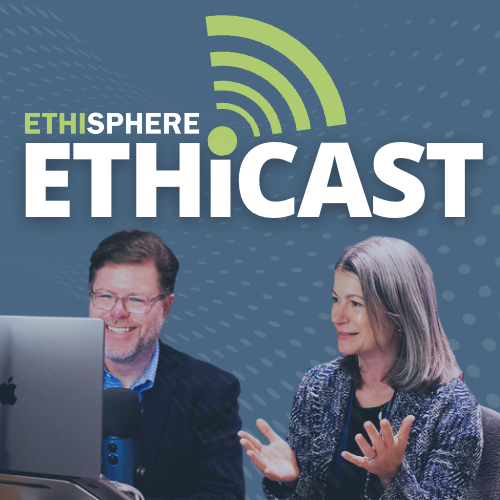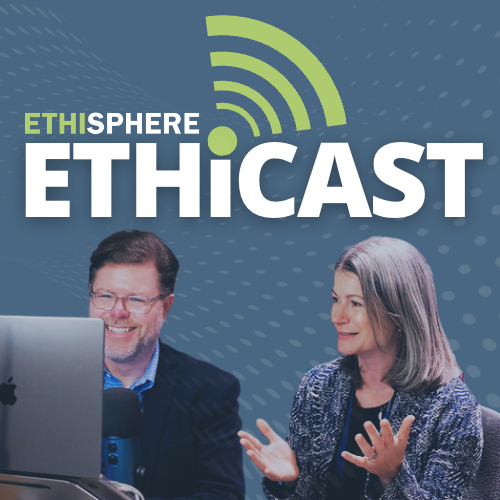Episode Transcript
[00:00:00] Speaker A: Hi, everyone. You've got questions and we've got answers. Welcome to another Bella Asks episode of the Ethicast.
The Business Ethics Leadership alliance, or bella, is a global ethics and compliance community that provides exclusive access to helpful data, benchmarking events and other resources to advance your E and C program. And with bella's concierge service, members can submit any question regarding ethics and compliance, and our internal experts will provide an answer, plus helpful resources with more information.
And while we invite everyone watching and listening to join bella, we also know that there is no competition in compliance, which is why we're using this program to thematically respond to high level questions from the Bella community for the benefit of ENC teams everywhere.
And joining us once again to answer those questions is Bella chair Erica Salmon Byrne. Erica, it's good to see you again.
[00:01:00] Speaker B: Bill, thank you so much for having me back. And today we've got a real doozy of a question.
[00:01:06] Speaker A: It is a program question and it reads, what are ENC best practices on managing material risk takers?
[00:01:13] Speaker B: Yes. So, Bill, when this question first came in, I was not sure what industry the question came in from. So material risk taker in my head then went to risk appetite, you know, things along those lines. But once I understood the industry that this particular question was coming in from, I realized that it's referring to a term of art in the financial services sector of material risk taker. And basically that means someone whose professional activities have a material impact on the firm's risk profile. In other words, a relatively senior person inside the business for the most part. So this is all. This is really as much a question about this specific designation of a person inside the organization as it is a way to think about something that challenges ethics and compliance professionals of all stripes in all industries, which is how do I deal with my leadership team? How do I think about my ethics and compliance program as it pertains to people who are making decisions on behalf of the business every day? That, to use the definition from the fca, has a material impact on the firm's risk profile. Right. That is the definition of a material risk taker. And we all have material risk takers, even if we don't necessarily designate them as material risk takers. Inside of our businesses, we have people who are in a position where they are making decisions about the risks that the business is taking on.
So the first piece of this is always going to go back to risk appetite and understanding what the risk appetite is for the business and increasingly what we're seeing companies do, which is A practice that I really encourage organizations to adopt is thinking about risk appetite at the risk level as opposed to just at the overall level. Right.
So my risk appetite personally for driving five miles over the speed limit on the highway, it's pretty high. Happy to do it. Right. My risk Appetite for driving 15 miles over the speed limit on the highway, especially out here in the west where I live, where it's already 75 miles an hour.
Pretty low, right? Pretty low. If you asked me what my overall risk appetite was, I would probably say it was pretty high. Right. Because I'd be thinking of a small risk as opposed to thinking of a large risk. So thinking about risk appetite at the, at the individual risk level as opposed to at sort of the meta category level is something we're seeing a lot of organizations do. And then think about how do I have the ethics and compliance conversation in the context of the company's overall strategy? Because if I'm dealing with someone who is making material risk decisions on behalf of the organization that, that would, that are going to materially impact the organization's risk appetite or risk behavior, then I need to make sure that the policies, procedures, training, communications, formal systems of my program are aligned with the strategic priorities of that particular individual as they're making those decisions. Because otherwise, as you and I are fond of saying, Bill, we all start sounding like Charlie Brown's parents. Right. I'm over here thinking about the growth of my particular part of the business and my division and you're here as the compliance person talking to me about antitrust or competition law or, you know, confidential information.
And you are wa wa, wa, wa, wa wa as far as I'm concerned. Right. So figuring out what your hook is, this is, you know, I, I mean, so much of what we do, Bill, comes back to that communications triangle. Right, right. What's my message? How am I actually going to get this person to pay attention to the things I'm asking them to pay attention to? How do I make sure that compliance is part of the conversation as they're making risk based decisions? How do I think about the way in which I'm monitoring that part of the business? So if you've got somebody who's a material risk taker, you need to think about what am I doing to keep an eye on what this person is up to as a compliance function so that I can get out in front of issues if I have to.
What information can I give them about the changing portfolio of the business so that they are making the right decisions in the context of their, their, their day to day behavior. So some of those pieces are really, you know, those are things that you're going to do no matter where you are in the compliance, in the, in the, in, in sort of an industry category. But, or who you're talking to. But really when you're talking to somebody who falls into this category, making sure that you've given some strong, strong analysis to what's my hook? How do I get this person to pay attention to what I'm saying and thinking and doing?
What's my message? What's my modality? When am I talking to them? All of those kinds of pieces and data is going to help in this regard.
There's definitely things that you can bring this person from a data perspective that will enable that conversation to go the way you want it to go. But, but, but starting with the strategy and starting with the risk would be the place that I would start.
[00:06:20] Speaker A: Well, Erica, as always, we appreciate you weighing in on these questions from the Bella community. Thank you so much for your insight.
[00:06:25] Speaker B: Absolutely, my pleasure. And to all those Bella members out there that are, that are listening in to Bill and I, please keep those questions coming. Okay.
[00:06:32] Speaker A: To learn more about Bella, visit ethisphere.com bella to request guest access to the member resource hub and to speak with the Bella Engagement Director. If you have a question that you would like answered on this program, contact the Bella Concierge service and we'll get to work on it for you.
This has been another Bella Asks episode of the Ethicast. We hope you've enjoyed the show. For more content like this every week, please subscribe to this program on YouTube, Apple Podcasts or Spotify. Thank you so much for joining us. And until next time, remember, strong ethics is good business.
[00:07:08] Speaker B: SA.


